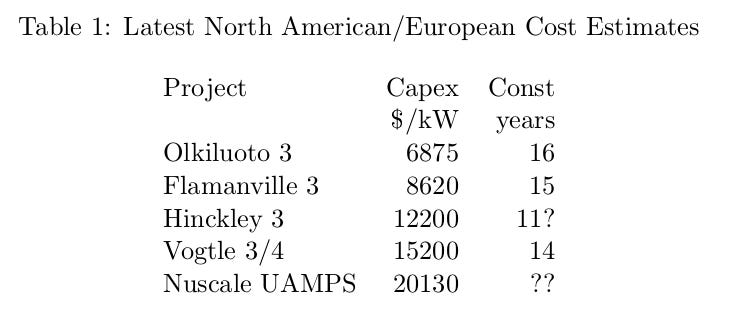The Nuscale Debacle
I was working on a piece on what nuclear should-cost and why, when some disturbing news came across my desk. In the Flop book I argue that military style procurement results in ships that cost thirty times what they should. It appears the US nuclear is now up to one third of that multiplier.
The costs of nuclear in the West is exploding even faster than I expected in the piece, The Great Nuclear Revival that Never was. The latest bombshell is from Nuscale. They informed the UAMPS consortium that the cost for a 477 MW plant would be 9.3 billion dollars. That's a preposterous $20,000 per kilowatt. Table 1 summarizes the latest carnage. Nuclear is a technology that has a should-cost of less than $2000/kW.
Nuscale is simply a scaled down light water reactor. This scale down allows the decay heat to be handled passively, eliminating many of the expensive safety systems required by a standard light water reactor. This should have made the plant cheaper.
Nuscale is the fair haired child of US nuclear. It has received at least 1.8 billion dollars in taxpayer money over the last decade. The Inflation Reduction Act will allow Nuscale's real price to be inflated by 31 $/MWh at taxpayer expense. All this support has resulted in the most expensive commercial nuclear reactor every created. When are we going to figure out it is not working?
An iron rule of empirical economics is: cost rises to price. If we rule out fossil and strangle nuclear with NRC style, ALARA based regulation, the price of electricity goes through the roof. Costs follow. Subsidies only exacerbate this process.
Nuclear must be unchained from the current regulatory system. But that's not enough. Nuclear needs unbridled competition from coal and gas to keep its costs in check. To push below the cost of fossil, nuclear needs unbridled competition from other nuclear.
When the Korean government fostered shipbuilding in the 1970's, they provided support to at least 3 major yards and promoted cut throat competition between those yards. Korean shipbuilding went from nothing to world dominance in less than 20 years.
Our energy policy must foster competition for nuclear and within nuclear, not simultaneously strangle and subsidize nuclear.



It appears there is a complete misunderstanding as to how big projects should be organised. Rather than enable innovators and entrepreneurs to get on with spending their money, or money they have borrowed, governments feel it is for them to guess what is wanted and dictate the requirements - when they (politicians and civil servants) have no actual understanding of how business works, and they also put utterly onerous legal or technical burdens onto new tech (especially anything perceived as dangerous ie nuclear). Levelling the playing field for energy, by putting the same burdens onto the all power providers - whether it be waste management or pollution - is a much better and, in the medium term, cheaper option.
And the specific requirements should be supply reliable electricity, 24/7/365. That is what we need.
Don't necessarily remove regulations associated with nuclear, just apply similar regulations to the other energy suppliers BUT separate the licensing body from the safety body - if they are one body (as at the moment) the 'safety' aspect will always trump the 'licensing' aspect, certainly for new and improved designs, and as one body, there is only down-side for them, to allowing a new design through, as if it 'goes wrong', the body is blamed, but they get none of the credit when all goes well.
Well said. More competition is needed throughout the energy sector. (And the health sector.)